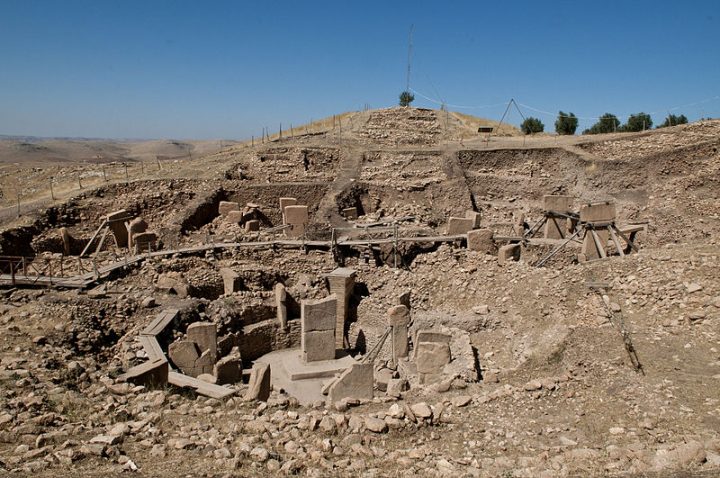The “modern” relationship between human beings and Work begins with the Neolithic Revolution when agriculture and animal husbandry coincides with the establishment of permanent settlements.
The beginning of this process in different regions has been dated from 10,000 to 8,000 BC in the Fertile Crescent. The transition from hunter-gatherer to agriculturalist was initially detrimental to the health of the population, something that has been attributed to the reduction in the diversity of food, but also to the increase in harder work needed to maintain a steady supply for the now growing settlements. Recent analyses point out that agriculture also brought about deep social divisions and in particular encouraged inequality between the sexes. Wikipedia
An interesting archeological site that corresponds to this moment in Göbeki Tepe excavated in 1994 by Germán Archeologist Klaus Schmidt which seems to be challenging some of the assumptions made about the chronology of the process. While it was classically assumed that organised religion followed the Neolithic Revolution and the establishment of permanent settlements, those who congregated in Göbeki Tepe for some kind of rituals were in fact hunter-gatherers who brought with them food from other areas. However, as the site developed and the visitors became more settled, the need to feed them appears to have been a factor in the development of plant domestication. That is, some people had to engage in hard Work.
As excavator Klaus Schmidt put it: “First came the temple, then the city”. Wikipedia. He should have added, and with it, Work.
The site seems to have inspired a little flurry of stories from those looking to find archeological proof of the Bible, who saw here perhaps the mythical Garden of Eden, but a more interesting interpretation has been proposed that the burden of the agricultural revolution with its consequences of bad health and hard work became over many years the memory of a “moment” allegorised as being expelled from Eden and having to get your bread “by the sweat of your brow”.
Whilst Work was regarded as a curse by ancient civilisations, the Protestant work ethics and seeing sloth as a deadly sin have created a culture based on the modern dogma that work is the meaning in life and every human being’s duty. There is horror at the thoughts that robots are in the future going to replace humans. But this does not distinguish between mindless, wearing out, menial and repetitive work, the most likely to be replaced by automation, from creative, research oriented and emotionally rewarding work, which may be made lighter by automation but certainly not replaced by it.
If we add that free time created by a reduction of the working week could be used for entertainment, learning and social activities, the future brightens up. The fear created by the automation scenario is based on the present trend of concentration of wealth and resources in fewer and fewer hands. So, the assumption is that automation will allow the rich to get astronomically richer and the workers will be massively unemployed.
Universal Basic Income (UBI)
The only way to address the collapse of the social structures brought about by automation is to ensure that all the population counts on enough money to cover a reasonable lifestyle. Not just “basic” needs but also those that allow full participatpion in community life. Experiments in UBI show that far from becoming “idle” people engage with enthusiasm in the creative tasks that motivate them. Instead of “working” for a salary people participate, engage, develop and learn.
Just like the Neolithic Revolution’s negative effects that took millennia to recover, the “Antropocene Revolution” we are facing runs the risk of having negative consequences if the values on which to base itself are a continuation of the dehumanisation we experience today. It requires then to become a “Humanist Revolution”, one in which the Human Being becomes the central value, rather than money and power, one in which solidarity rather than individualism and cooperation rather than competition form the basis for new forms of relation and production. Work cannot be the meaning of human life as each individual must have the freedom to explore the meaning of their own existence.
We return then to the motor of the leaps the Human Being takes in its evolution. If a spiritual search preceded some of the most drastic changes, perhaps it is again necessary to find in the depth of human consciousness the spark of the new state of being. This is the key to choose the path that opens the future for all of humanity rather than just a tiny powerful minority. Being able to implement policies such as the UBI and a return to the Commons would be the reflection (and inducer in permanent feedback) of the existential changes that will allow human beings to emerge from their present dehumanisation. It would be not the “return” to a mythical Eden, but the creation of a society based on an image that was always beckoning from the future.










